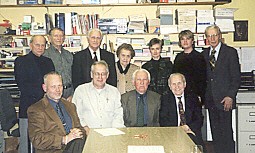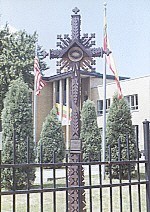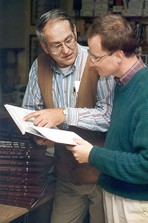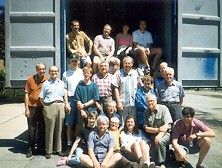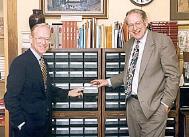
LITHUANIAN RESEARCH AND STUDIES CENTER BOARD OF
DIRECTORS
The Board of Directors consists of representatives of the organizations with the
largest inventories at the Lithuanian Research and Studies Center:
(Click underlined name to see biography)
Robertas Vitas Ph.D. – Chairman (Representing the Lithuanian Catholic
Academy of Sciences, Inc.)
Augustinas Idzelis (dec.), Ph.D. - Board
Member, ex officio, LRSC President
Kristina Lapienyte Bareikiene -
Executive Vice President (Representing
Lithuanian Institute of Education, Inc.)
Dr. Jurgis Anysas - Board Member
(Representing the Lithuanian
American Community, Inc. Cultural
Affairs Council)
Vytas Beleska – Board Member (Representing the Zilevicius-Kreivenas
Musicology Archives Board of Trustees)
Peter Buchas – Board Member (Representing the Lithuanian American
Council, Inc.)
Vytas Maciunas - Board Member (Representing the Lithuanian American
Community, Inc.)
Dr. Audrius Plioplys (Representing Art Archive)
Andrius Remeikis - Board Member (Representing the Remeikis Library of
Political Sciences)
Dr. Giedrius Subačius - Board Member (Representing the Lithuanian
American Community, Inc.)
LITHUANIAN RESEARCH AND STUDIES CENTER ADMINISTRATION
AND ASSOCIATES
Augustinas Idzelis, Ph.D. - LRSC President
Kristina Lapienytė-Bareikienė - Executive Vice President
Loreta Timukienė - Vice President, Community Affairs
Enata Skrupskelis - Director of Libraries
Genė Razumienė - Director of Zilevicius-Kreivenas Musicology Archive
Vytas Beleška - Musicology Archives
Juozas Bendikas
Dr. Indrė Antanaitis
Gediminas Indreika
Vaida Armanavičiūtė -Director of Special Projects
Rima Gungor - Media Projects
TOP OF PAGE
LITHUANIAN RESEARCH AND STUDIES CENTER – A BRIEF HISTORY
The idea for the Lithuanian Research and Studies Center was born at the time A.
Kantautas began preparing a bibliography of Lithuanian publications in the
diaspora. He wrote to libraries, museums and archives in the United States, seeking
information on existing Lithuanian publications. The Director of the Lithuanian World
Archives at that time, Ceslovas Grincevicius, could not provide Mr. Kantautas with
any satisfactory information, however. This was because the library and archives
were not inventoried; everything was in boxes and storage cabinets. At the time, the
Lithuanian World Archives had no funding or staff who
could organize the collections properly. This burden lay
entirely on the shoulders of C. Grincevicius, as he alone
was collecting and storing the archival materials.
When, in 1975, the monumental bibliography of Lithuanian
publications by A. Kantautas appeared, nowhere did it
mention the collections of the Lithuanian Wolrd Archives.
Prof. Jonas Rackauskas, together with a group of
colleagues created a plan to not only collect and preserve,
but to register and catalogue the holdings of the Lithuanian
World Archives, to make them accessible to researchers,
scholars, students, and the public alike.
The Zilevicius-Kreivenas Musicology Archives was in a similar state, in that there was
no financing, no staff, and a lack of space and supplies. There were no telephones,
copying machines or computers. The archives in question were, in fact, merely
warehouses for historical materials. The first volume of the A. Kantautas
bibliography, published in 1975 (725 pages), notes that no reply was received from
the Lithuanian World Archives while compiling the bibliography and that no
information was available. Only in 1979, in A. Kantautas’ revised bibliography were
the collections of the Lithuanian World Archives mentioned, because at that time the
staff and colleagues of the Lithuanian Research and Studies Center, headed by
Jonas Rackauskas and Robertas Vitas, had already begun their work.
After finalizing the plan of operation in 1980, which was based upon the decision to
unifying various Lithuanian scholarly and education organizations under the umbrella
of one institution, the Lithuanian Research and Studies Center was founded in
1981. Among the founders were: Dr. Adolfas Damusis, the historian Jonas
Dainauskas, Director of the Lithuanian World Archives Ceslovas Grincevicius, Rev.
Vaclovas Gutauskas, S.J., Bronius Kviklys, Dr. Arunas Liulevicius, Dr. Jonas
Rackauskas, and Dr. Robertas Vitas.
The primary goal in founding the Lithuanian Research and
Studies Center was to collect documentary/archival material
reflecting Lithuanian culture, literature, history, etc., so that
it could be preserved, organized, and made accessible for
current research and for generations to come. Now, more
than twenty years after it was founded, the Lithuanian
Research and Studies Center prides itself on the vast
scope of productivity and the many various projects seen
to fruition.
The success of the Lithuanian Research and Studies
Center is due in no small part to the accomplished staff of
research associates, administrators and volunteers. At the
heart of the Center’s operations are Chairman of the Board
dr. Robertas Vitas, LRSC President Dr. Augustinas
Idzelis, and Executive Vice President Kristina Lapienyte. The archives are ever-
expanding thanks to continuous donations of materials from Lithuanians around the
world. Once the materials reach the Center, they are sorted, registered,
catalogued, and prepared for preservation. The M. Mazvydas National Library of
Lithuania generously provides the archives and libraries at the Center with the latest
publications and periodicals from Lithuania.
Visiting specialists from Lithuania assist in the
archives and libraries. The LRSC has several
on-going cooperation agreements with many
institutions in Lithuania: the M. Mazvydas
National Library of Lithuania, the Genocide
and Resistance Research Center of Lithuania,
the Department of Archives of the Republic of
Lithuania, and various universities, museums,
and other scholarly and cultural institutions,
whose visiting scholars and specialists often
advise and assist on projects at the LRSC. The
Lithuanian Research and Studies Center provides support to various institutions in
Lithuania by sending books and other printed matter, many of them titles and
publications that are difficult to acquire. To date, the Lithuanian Research and
Studies Center has sent nine shipping containers (approx. 405 tons) of books and
other printed materials to Lithuania.
Scholars from all parts of the United States and
around the world have visited the LRSC to do
research in the archives. The LRSC has hosted
visitors researching topics dealing with Lithuania
from Canada, Japan, Italy, Sweden, Denmark,
England and other countries. The LRSC prepares
informational articles on various aspects of Lithuania
and Lithuanians for encyclopedias, continually
striving to advance information on Lithuanian culture,
art, and scholarship. Many a doctoral candidate from
various universities in the United States has found specific data at the LRSC that he
or she had been seeking but was unable to find elsewhere.
The Lithuanian Research and Studies Center is supported by donations from the
public and grants from the Lithuanian Foundation, Inc., without which many projects
would go unrealized.
TOP OF PAGE
DIRECTORS
The Board of Directors consists of representatives of the organizations with the
largest inventories at the Lithuanian Research and Studies Center:
(Click underlined name to see biography)
Robertas Vitas Ph.D. – Chairman (Representing the Lithuanian Catholic
Academy of Sciences, Inc.)
Augustinas Idzelis (dec.), Ph.D. - Board
Member, ex officio, LRSC President
Kristina Lapienyte Bareikiene -
Executive Vice President (Representing
Lithuanian Institute of Education, Inc.)
Dr. Jurgis Anysas - Board Member
(Representing the Lithuanian
American Community, Inc. Cultural
Affairs Council)
Vytas Beleska – Board Member (Representing the Zilevicius-Kreivenas
Musicology Archives Board of Trustees)
Peter Buchas – Board Member (Representing the Lithuanian American
Council, Inc.)
Vytas Maciunas - Board Member (Representing the Lithuanian American
Community, Inc.)
Dr. Audrius Plioplys (Representing Art Archive)
Andrius Remeikis - Board Member (Representing the Remeikis Library of
Political Sciences)
Dr. Giedrius Subačius - Board Member (Representing the Lithuanian
American Community, Inc.)
LITHUANIAN RESEARCH AND STUDIES CENTER ADMINISTRATION
AND ASSOCIATES
Augustinas Idzelis, Ph.D. - LRSC President
Kristina Lapienytė-Bareikienė - Executive Vice President
Loreta Timukienė - Vice President, Community Affairs
Enata Skrupskelis - Director of Libraries
Genė Razumienė - Director of Zilevicius-Kreivenas Musicology Archive
Vytas Beleška - Musicology Archives
Juozas Bendikas
Dr. Indrė Antanaitis
Gediminas Indreika
Vaida Armanavičiūtė -Director of Special Projects
Rima Gungor - Media Projects
TOP OF PAGE
LITHUANIAN RESEARCH AND STUDIES CENTER – A BRIEF HISTORY
The idea for the Lithuanian Research and Studies Center was born at the time A.
Kantautas began preparing a bibliography of Lithuanian publications in the
diaspora. He wrote to libraries, museums and archives in the United States, seeking
information on existing Lithuanian publications. The Director of the Lithuanian World
Archives at that time, Ceslovas Grincevicius, could not provide Mr. Kantautas with
any satisfactory information, however. This was because the library and archives
were not inventoried; everything was in boxes and storage cabinets. At the time, the
Lithuanian World Archives had no funding or staff who
could organize the collections properly. This burden lay
entirely on the shoulders of C. Grincevicius, as he alone
was collecting and storing the archival materials.
When, in 1975, the monumental bibliography of Lithuanian
publications by A. Kantautas appeared, nowhere did it
mention the collections of the Lithuanian Wolrd Archives.
Prof. Jonas Rackauskas, together with a group of
colleagues created a plan to not only collect and preserve,
but to register and catalogue the holdings of the Lithuanian
World Archives, to make them accessible to researchers,
scholars, students, and the public alike.
The Zilevicius-Kreivenas Musicology Archives was in a similar state, in that there was
no financing, no staff, and a lack of space and supplies. There were no telephones,
copying machines or computers. The archives in question were, in fact, merely
warehouses for historical materials. The first volume of the A. Kantautas
bibliography, published in 1975 (725 pages), notes that no reply was received from
the Lithuanian World Archives while compiling the bibliography and that no
information was available. Only in 1979, in A. Kantautas’ revised bibliography were
the collections of the Lithuanian World Archives mentioned, because at that time the
staff and colleagues of the Lithuanian Research and Studies Center, headed by
Jonas Rackauskas and Robertas Vitas, had already begun their work.
After finalizing the plan of operation in 1980, which was based upon the decision to
unifying various Lithuanian scholarly and education organizations under the umbrella
of one institution, the Lithuanian Research and Studies Center was founded in
1981. Among the founders were: Dr. Adolfas Damusis, the historian Jonas
Dainauskas, Director of the Lithuanian World Archives Ceslovas Grincevicius, Rev.
Vaclovas Gutauskas, S.J., Bronius Kviklys, Dr. Arunas Liulevicius, Dr. Jonas
Rackauskas, and Dr. Robertas Vitas.
The primary goal in founding the Lithuanian Research and
Studies Center was to collect documentary/archival material
reflecting Lithuanian culture, literature, history, etc., so that
it could be preserved, organized, and made accessible for
current research and for generations to come. Now, more
than twenty years after it was founded, the Lithuanian
Research and Studies Center prides itself on the vast
scope of productivity and the many various projects seen
to fruition.
The success of the Lithuanian Research and Studies
Center is due in no small part to the accomplished staff of
research associates, administrators and volunteers. At the
heart of the Center’s operations are Chairman of the Board
dr. Robertas Vitas, LRSC President Dr. Augustinas
Idzelis, and Executive Vice President Kristina Lapienyte. The archives are ever-
expanding thanks to continuous donations of materials from Lithuanians around the
world. Once the materials reach the Center, they are sorted, registered,
catalogued, and prepared for preservation. The M. Mazvydas National Library of
Lithuania generously provides the archives and libraries at the Center with the latest
publications and periodicals from Lithuania.
Visiting specialists from Lithuania assist in the
archives and libraries. The LRSC has several
on-going cooperation agreements with many
institutions in Lithuania: the M. Mazvydas
National Library of Lithuania, the Genocide
and Resistance Research Center of Lithuania,
the Department of Archives of the Republic of
Lithuania, and various universities, museums,
and other scholarly and cultural institutions,
whose visiting scholars and specialists often
advise and assist on projects at the LRSC. The
Lithuanian Research and Studies Center provides support to various institutions in
Lithuania by sending books and other printed matter, many of them titles and
publications that are difficult to acquire. To date, the Lithuanian Research and
Studies Center has sent nine shipping containers (approx. 405 tons) of books and
other printed materials to Lithuania.
Scholars from all parts of the United States and
around the world have visited the LRSC to do
research in the archives. The LRSC has hosted
visitors researching topics dealing with Lithuania
from Canada, Japan, Italy, Sweden, Denmark,
England and other countries. The LRSC prepares
informational articles on various aspects of Lithuania
and Lithuanians for encyclopedias, continually
striving to advance information on Lithuanian culture,
art, and scholarship. Many a doctoral candidate from
various universities in the United States has found specific data at the LRSC that he
or she had been seeking but was unable to find elsewhere.
The Lithuanian Research and Studies Center is supported by donations from the
public and grants from the Lithuanian Foundation, Inc., without which many projects
would go unrealized.
TOP OF PAGE
